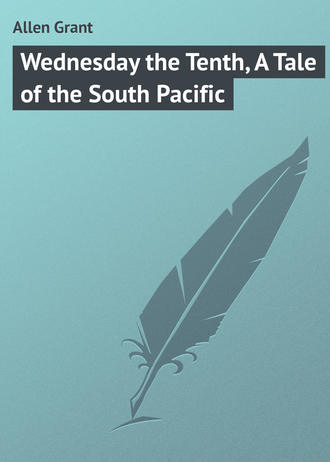 полная версия
полная версияWednesday the Tenth, A Tale of the South Pacific
As for the boys, they handled them like so many animals in a market. "Turn round, cochon! Show me your faces! Mille tonnerres, let me see how you can run, you dirty young blackguard!" They examined them as a veterinary would examine a horse. "Why, there was our little fellow, Nangaree," Jack said to us with deep concern – "Nangaree, that used to clean up things for mother at the mission-house: his father sold him for twenty dollars. The captain looked at his legs, and at the glands in his throat, to see if he'd had the chicken-pox and the measles. Then he said to his mate, 'This lot's cheap enough. He's a first-rate lad, and can speak English. He'll do for the hold. Bundle him along!' And the mate caught him up by the scruff of his neck and hauled him to the boats, kicking and screaming; and that was the last we saw of poor Nangaree!"
For three days and nights, it seems, this horrible inhuman market or slave-fair went on upon the beach, the Frenchmen taking care to keep the natives well primed with spirits all the time, till they'd got their hold full, and were prepared to sail away again with their living cargo. Then at last they upped anchor, and out of the harbor. But before they went, the skipper, it appears, who was angry at the missionaries for having interfered with him, and was afraid they might report his proceedings to the British Government when next the mission ship came that way on her provisioning rounds, took aside the Chief in a confidential chat, and tried to inflame his mind, all mad drunk that he was, against the English residents. Apparently he had made so good a three days' work of it with his horrible trade, and found it so convenient to draw his supplies from this remote and almost unvisited island, that he thought it would be nice if before his next visit he could get rid altogether of these meddlesome strangers. He didn't want European witnesses to crop up against him in future; so he told the Chief, with a great show of confidence, that Macglashin and his friends were not English at all, but Scotch; and he pointed out that it was uncomfortable for the natives to be interfered with in their trading operations by a set of white-livered curs who objected to the selling of boys and girls into temporary slavery. Surely a Chief had a right to do as he would with his own subjects! What else he said, Heaven knows, but this is what happened as soon as the French, with their horrid cargo, had got well clear of the unhappy island.
That very afternoon, the Chief, beginning to get sober again, but quarrelsome from headache and the other after-effects of a long debauch, came round to the mission-house in a towering rage, and asked the unsuspecting missionary, "Say, white man, are you a Scotchman?"
"Yes," says Macglashin, not knowing what was coming. "I'm a Scotchman, Chief, certainly. I was born in Scotland."
The Chief laughed loud. "Ha, ha," he said, "then Queenie England no take care a you. No send gunboat to shoot us all dead, if man a Tanaki come up and kill you."
At that Macglashin grew alarmed, and answered, "O, yes! The Queen of England would certainly avenge us." And he tried to explain the exact relation in which Scotchmen stood to the British crown – that they were just as much British subjects as Englishmen, entitled to precisely the same amount of protection. But the Chief couldn't be made to understand. The French skipper had evidently poisoned his mind against them. "Man a Tanaki don't want no Scotchman interfere with Chief when him go to sell him boy and him woman," the savage said angrily. "Tanaki belong a Queenie England. Queenie England no want Scotchman interfere with people in Tanaki. Scotchman better keep quiet in him house. Queenie England no mind Scotchman."
And no amount of reasoning produced any effect upon him.
The missionaries went to bed that evening with many misgivings. They felt that for the first time, so far as the natives were concerned, the powerful protection of the British flag was now practically withdrawn. They were alone, as strangers, among those excited black fellows.
At dead of night, while the two boys slept, a horrible din outside the mission-house awoke them. They looked out, and saw the red glare of torches outside. A frightful horde of Kanakas, naked save for their war-paint, drunk with the Frenchman's rum and armed with his Sniders, surrounded the frail building in a hideous mob of savagery. As Martin put his head out of the lattice a bullet came whizzing past. He withdrew it for a moment, terrified, and then looked out again. As he did so the other Scotch missionary appeared upon the veranda, half-dressed, and holding up his hand in dignified remonstrance, began in Kanaka with his gentle mild voice, "My friends, my dear friends, …" Before he could get any further, the Chief stepped forward, and aiming a blow at his gray locks with a sacred native tomahawk, felled the peaceful old teacher senseless to the ground. Martin shuddered with horror. The old man lay weltering in a pool of his red gushing gore, while the savages danced in triumph over his prostrate body, or smeared themselves with great lines and circles of his warm heart-blood.
"Come on!" the Chief cried in Kanaka. "Kill all! Kill every one! They're taboo to our gods. Don't fear their gunboats. Queenie England won't trouble to protect a Scotchman!"
Then began a hideous orgy of wild lust and slaughter. The savages rushed on, drunk with blood and rum, and dragged out the wife and children of the other missionary, whom they brained upon the spot, before the terrified eyes of the trembling Macglashins. The trader Williams ran up just then, with his revolver in his hand, followed by two faithful black servants from a neighboring island; but the French skipper had been cunning enough there too. "Him a Welshman!" the savages cried. "Queenie England no care for him!" For indeed he happened to be born in Wales. And they shot him down as he came, before he could open fire upon them. Then they turned to massacre the Macglashins, the only remaining Europeans on the island.
But just at that moment a sudden idea seemed to strike the Chief. He cried out, "Stop!" The savages fell back and listened with eagerness to what was coming. Then the Chief shouted out again in Kanaka – "I have a thought. The gods have sent it to me. This is my thought. We have killed enough for tonight. Let us catch them alive and bind them. Next moon is the great feast of my father Taranaka. I have an idea – a divine idea. Let us keep them till that day, and then, in honor of the gods, let us roast them and eat them."
The whole assembly answered with a wild shout of delighted assent – "Taranaka! Taranaka! Our great dead Chief! In honor of Taranaka, let us roast them and eat them."
So they rushed wildly on upon the defenseless white family, bound them in rude cords of native make, and carried them off in triumph to Taranaka's temple tomb in the palm-grove.
And that was as much as we could allow the boys to tell us at a time, of their strange adventures. We were afraid of overtaxing their strength at first, and tried to confine their attention as much as possible to tinned meats and sea-biscuit soaked in condensed milk; though I'm bound to admit that as soon as they began to recover appetite a bit, they addressed themselves steadily and seriously to their food, with true British pluck and perseverance. In spite of the terrors from which they had just escaped, they did the fullest justice to Serang-Palo's cookery.
CHAPTER V.
A BREAK-DOWN
Time went on, and the boys began to grow visibly fatter. It was Tuesday evening, and we hoped, putting on all steam as we were doing, to reach Tanaki by the small hours of Wednesday morning, in good season to relieve the four unhappy souls still, as we believed, detained there in captivity. We were strained on the very rack of excitement, indeed, with our efforts to arrive before the savages could take any further step; and the boys' anxiety for their parents' and their sister's safety had naturally communicated itself to us, as we listened to their story. Why, it was that very evening that Martin had told us the rest of his strange tale – how his father and mother, with his younger brother Calvin and his sister Miriam, had been confined by the savages in the grass-hut temple, while he and Jack were put to lie in an open out-house hard by, guarded only by a single half-intoxicated Kanaka. Well, in the middle of the night, those two brave boys had silently gnawed their ropes asunder, and creeping past their guard had stolen away to the beach in the desperate effort to escape in search of assistance. There, they luckily found the mission boat hauled down on the shore; and waiting only to take a can of water from the spring close by, and a bunch of half-ripe bananas from a garden on the harbor, they had put forth alone on their wild and adventurous voyage across the lone Pacific. I can tell you, it brought the tears to our eyes more than once, rough sailors as we were, to hear the strange story of their hopeless sail, and it made our blood boil to learn how these ungrateful savages had repaid the earnest and devoted life-labor of the unhappy missionaries.
"No wonder him hungry," that young monkey Nassaline said, with profound condolence, "if him don't hab nuffin to eat for ten day long but unripe banana." Anything that concerned the human stomach always touched a most tender and responsive chord in Nassaline's sympathies.
At eight bells when my watch was up, I went off for a quiet snooze to my cabin. I knew I should be wanted for hot work about three in the morning, for I didn't expect to effect the rescue without a hard fight for it; so I thought it best to get what sleep I could before arriving at the islands. So I lay in my berth, with my eyes shut, and a thin sheet spread over me (for it was broiling hot tropical weather), and I was just beginning to doze off in comfort, when suddenly I felt something move under me like a young earthquake. Next minute I was jolted clean out of my bed, with such a jerk that I thought at first we were all going to sleep on the bed of the ocean.
"Halloo," I cried out to Jim up atop, rushing out of my cabin. "What's up? Anything wrong? What's happened?"
"Grazed a reef, I guess," Jim shouted back, calmly. "No land in sight, but shoal water and breakers ahead. We seem to be in danger."
Cool chap, Jim, under no matter what circumstances. But this looked serious. In a second I was up, and peering out over the bows into the dark black water. The Albatross had slowed, and was reversing engines. All round us we could see great heaving breakers.
"No land hereabouts," Jim sung out, consulting the chart once more. "We ought to be at least five miles to suth'ard of the Great Caycos Band Reef."
As he spoke, I saw Martin's white face appearing suddenly at the top of the companion-ladder. He flung up his hands in an agony of despair. "Oh, how terrible!" the poor lad blurted out in his misery. "I ought to have remembered! I ought to have told you! Father says the charts hereabouts are all many miles wrong in their bearings. The Caycos Reef lies six or seven knots south by west of the point it's marked at!"
In a ferment of anxiety I turned up our other Sydney charts at once to test his statement. Sure enough there was a discrepancy, a considerable discrepancy, both in latitude and longitude, between the two maps. At the margin of one I read this vague and uncomfortable note – "These islands are reported by certain navigators to lie further south and west than here laid down, and have never been accurately surveyed by good authorities. Careful navigation by day alone is recommended to master mariners."
Jim looked at me, and I looked at Jim. What on earth could we do in such a fix as this? To go on in the dark, with unknown reefs before us, was to imperil the Albatross and all on board; to cast anchor where we stood and hold back till daylight was to risk not arriving in time to rescue the unfortunate missionary with his wife and family. I glanced at the boy's white face as he stood by the companion-ladder, and made up my mind at once. Come what might, I must push forward and save them.
"Slow engines," I called down the pipe, "and proceed half-speed till further orders. Jim, go for'ard, and keep a sharp eye on the breakers. As soon as we're clear, we'll steam ahead full pelt again, and risk going ashore sooner than leave these poor folks on the island to be cruelly massacred."
"Thank you," the boy said, with an ashy face, and lay down upon the deck, unmanned and trembling. His lips were as white, I give you my word, as this sheet of paper I'm this moment writing upon.
For a hundred yards or so we slowed, and went ahead without coming to any further stop; then suddenly, a sharp thud – a dull sound of grating – a thrill through the ship; and Jim, looking up from in front, with a cool face as usual, called out at the top of his voice, but with considerable annoyance, "By Jove, we're aground again!"
And so we were, this time with a vengeance.
"Back her," I called out, "back her hard, Jenkins!" and they backed her as hard as the engines could spurt; but nothing came of it. We were jammed on the reef about as tight as a ship could stick, and no power on earth could ever have got us off till the tide rose again.
Well, we tried our very hardest, reversing engines first, and then putting them forward again to see if we could run through it by main force; but it was all in vain. Aground we were, and aground we must remain till there was depth of water enough on the reef to float us.
Fortunately the tide was rising fast, and three hours more would see us out of our difficulties. Three hours was a very serious delay; but I calculated if we got off the reef by two in the morning, we should still have time to reach Tanaki pretty comfortably before seven. We must enter the harbor by daylight, no doubt, which would perhaps be dangerous; because when the savages saw us arrive, they might make haste to cut the white people's throats before we could get up to rescue them. But I thought it more likely they would try to save them, to prevent our opening fire upon them by way of punishment; so with what comfort we could, we stuck on upon the reef, and waited for the inevitable tide to come and float us.
Waiting for the tide is always slow business.
At about half-past one, however, the water began to deepen under the ship, and we could feel her rise and fall – bump, bump, bump – with each onslaught of the breakers. Now bumping on a reef isn't exactly wholesome for a ship's bottom, so I gave the word to Jenkins for the engines to go to work again; and presently, after two or three unsuccessful attempts, we got her safe off, by energetic reversing, and found to our great delight that the Albatross, like a tight little craft that she was, had sprung no leak, and was making no water. Her sound old timbers had just grazed the surface of that flat-topped reef without suffering any serious internal injury.
As soon as we were free, and had examined our hold, I shouted down once more, "Now forward, boys, as hard as you can go, and mind, Jenkins, you make her travel!"
To my immense surprise, instead of obeying my orders, the Albatross suddenly stood stock-still in the trough of a wave, drifting helplessly about like a log on the ocean.
"Now then," I shouted down again, half angry and half alarmed. "What are you doing there, Jenkins? Didn't you hear what I said? Stir your stumps, my friend! Double time, and forward!"
Imagine my horror when the engineer shouted back in a voice of blank dismay, "I can't, sir. She won't work. Don't answer to the valve. We've injured something in backing her off the reef there."
This was an awkward job. And at such a crisis, too! In a minute I was down in the engine-room myself, inspecting all the valves and bearings with lamp in hand, and with the closest scrutiny. Before long we had ascertained the extent of the injury. A piece of the engine was broken that would certainly take us six or eight hours to repair. And it was already two o'clock on the Wednesday morning!
But that wasn't all, either. Another serious difficulty beset us in our work. We were beating about in the angry sea off the Caycos Reef, with the breakers dashing in, and the surf running high. If we tried to mend the broken engine where we stood, we should infallibly be dashed to pieces on the dangerous shallows. You can't go to work like that on a lee shore, with no engine to fall back upon, and the wind blowing half a gale. The only thing possible for us was to hoist sail and make for the open sea to southward under all canvas. That was taking us further away from Tanaki, of course; but it was our one chance of getting our engine repaired in peace and quiet.
So we hoisted sail and stood out to sea once more, leaving the dim long line of surf gradually behind us on the lee, and beating by constant tacks against the wind, which had now veered to the southeast, and was blowing us straight on to the Caycos shallows.
By four o'clock we'd got so far out that we thought we might lie to a bit and take a few hands off navigating duty to assist the engineer in repairing his engine.
But it proved a much more difficult and lengthy task to retrieve the mischief than we had at first sight at all anticipated. The minutes went by with appalling rapidity. Five o'clock came, and the smith was only just getting his iron well hammered into shape. Six o'clock, and the engineer was still fitting the place it came from. Seven o'clock – something wrong, surely, with the ship's time! Before this hour I had hoped to be anchored off the harbor of Tanaki.
Seven o'clock on Wednesday morning; and by twelve at noon, so the boys assured us, the ovens would be made hot at Taranaka's tomb for those unfortunate prisoners on the remote island!
Oh, how frantically we worked for the next two hours! and how remorselessly everything seemed to turn against us! How is it that whenever one's in the greatest hurry all nature seems to conspire to defeat one's purpose? I won't attempt to explain to you all the petty mishaps and unfortunate failures that attended our efforts. It seemed as if iron, wood, and coal – all inanimate matter itself – was banded together to make our further approach to Tanaki impossible. By nine o'clock I knew the worst myself. The breakdown to the engine was far more serious than we had at first imagined. I felt sure that before noon at earliest, with all our skill and toil, we couldn't possibly repair it.
But I shrank from telling those two poor trembling lads that there was no hope now left of saving their parents.
Gradually, however, as the day wore on, they discovered it themselves – they saw that the golden opportunity had been lost for us. As each hour passed by they told us with ever redoubled horror what they knew must at that moment be passing on the island. Now the savages would be bringing their father out before the prison hut, and sacrificing him with their tomahawks by the hideous blood-stained altar of their great dead chieftain. Now their poor mother would be crouching on the ground, trying in vain to protect their helpless little brother. Now Miriam herself, little golden-haired, three-year-old, innocent Miriam – but at that last horror they broke down in tears, and could say no more. They could only sob and hide their faces in their hands with speechless agony at that unspeakable picture.
By noon we knew the worst must be over. They were at rest now, poor souls, from their month-long misery. The afternoon dragged on and we still worked hard on the mere chance of some respite which might enable us to rescue them. But we felt sure the end had come for all that. We worked away by the mere force of pure aimless energy. It distracted us from thinking of the awful events which we nevertheless in our hearts felt certain must have happened.
It was eight at night before we got the Albatross fairly under way again; and even then she lumbered slowly, slowly on, the engine being only somehow repaired, in the most clumsy fashion, till we could reach harbor once more, and quietly overhaul her.
So we steamed ahead, feebly and cautiously, all night long, keeping a sharp lookout for land across our bows, and with Martin on deck almost all the time, to aid us by his close personal knowledge of the island approaches.
Wednesday the tenth was over now. The terrible day had come and gone. We didn't doubt that the massacre was completed long before the clock struck one on Thursday morning.
CHAPTER VI.
ON THE ISLAND
At Tanaki meanwhile, as we afterwards learned by inquiry among the islanders, things had been going on with the unhappy missionary very much as our worst fears had led us to expect. Though I wasn't there at the time to see for myself, I got to know what happened a little later almost as well as if I'd been on the spot; so I shall take the liberty once more – not being one of these book-making chaps – of telling my story my own way, and explaining how matters went in rough sailor fashion, without trying to let you know in detail how we found it all out till I come to explain the upshot of our present adventures.
Well, on the night when Martin and Jack stole away from the hut and got clear off on their venturesome journey in the mission boat, their father and mother, with little Calvin, who was eight years old, and Miriam, who was a pretty wee lassie of three, were heavily guarded by half a dozen desperate and drunken savages in the temple-tomb of the deceased Taranaka. It was a thatched native grass-house, with a bare mud floor, and a rough altar-slab raised high on the threshold, which covered the remains of the blood-thirsty old chieftain – the man who in his early youth had seen "Capitaney Cook" when he discovered the islands. The Melanesian natives, I ought to tell you, regard their dead ancestors as a sort of gods or guardian spirits, and frequently offer up food and drink at their graves as presents to appease them. Every morning gifts of taro, bread-fruit, and plantain were laid on the altar by Taranaka's tomb; and once every ten days a little square gin, mixed with cocoa-milk, was poured out upon the rude slab of unsculptured stone, that the dead chief's ghost might come to drink of it and be satisfied. Wednesday the tenth was the anniversary of Taranaka's death (he had been killed in a fight with some neighboring islanders, who fell out with him over the wreck of an American whaling vessel), and it was on that festival day that the chief proposed offering up the blood of our fellow-countrymen as an expiation to the shades of his departed relative.
Macglashin and his wife never even knew that the boys had escaped. If they had, those long days of suspense might have been even worse for them. They might have been looking forward with mad hope to some miracle of rescue such as that which the Albatross had so boldly planned, and which had been so cruelly interfered with by the breakdown of our machinery. As it was, the savages carefully kept from them all knowledge of their boys' escape. They never even breathed a hint of that desperate voyage. Every day, on the contrary, when they brought the unhappy missionary and his wife their daily rations of yam and banana, they taunted them with threats of what tortures the Chief had still in store for Jack and Martin. They were fatting them up, they said, for Taranaka to feed upon. On Taranaka's day they would be offered up as victims on the cannibal altar.
But the most terrible part of all the poor father and mother's sufferings was the fact that they couldn't keep the knowledge of that awful fate in store for them even from Calvin and pretty little Miriam. Macglashin's diary, which I read later on, was just heartrending about the children. Those helpless mites cowered all day long on the bare mud floor of that hideous temple, awaiting the horrible doom that the savages held out before them with the painful resignation of innocent childhood. They were too frightened to cry over it; too frightened to talk of it; they only crouched pale and terrified by their mother's side, and dragged out the long day in horrible apprehensions. They knew they must die, and they sat there watching for that inevitable sentence to be carried out with the stoical fortitude of utter childish helplessness. Well, there – I'm an old hand on the sea, you know, and I don't mind the dangers of the wind and waves for grown men and boys that can look after themselves, any more than most of you land-folks mind dodging about in the Strand at Charing Cross on a crowded afternoon in the London season; but I can't bear to talk or even to think of what those poor children suffered all those terrible days in the heathen tomb-house. There are things that make a man's blood run cold to speak about. That makes mine run cold: I can't dwell on it any longer; it's too ghastly to realize.









